Evaluating cognitive abilities is a challenge for recruiters and hiring managers aiming to hire analytically strong candidates. Using well-crafted questions can streamline your interview process and help identify top talent capable of complex problem-solving.
This blog post provides a comprehensive list of cognitive ability interview questions tailored for different roles and analytical capacities. You will find questions ranging from basic to situational, designed to assess key cognitive functions in junior to advanced analysts.
By incorporating these questions into your interview strategy, you'll enhance your selection process and ensure better hiring outcomes. Additionally, consider using our cognitive ability test for a more thorough pre-screening.
Table of contents
15 basic Cognitive Ability interview questions and answers to assess applicants
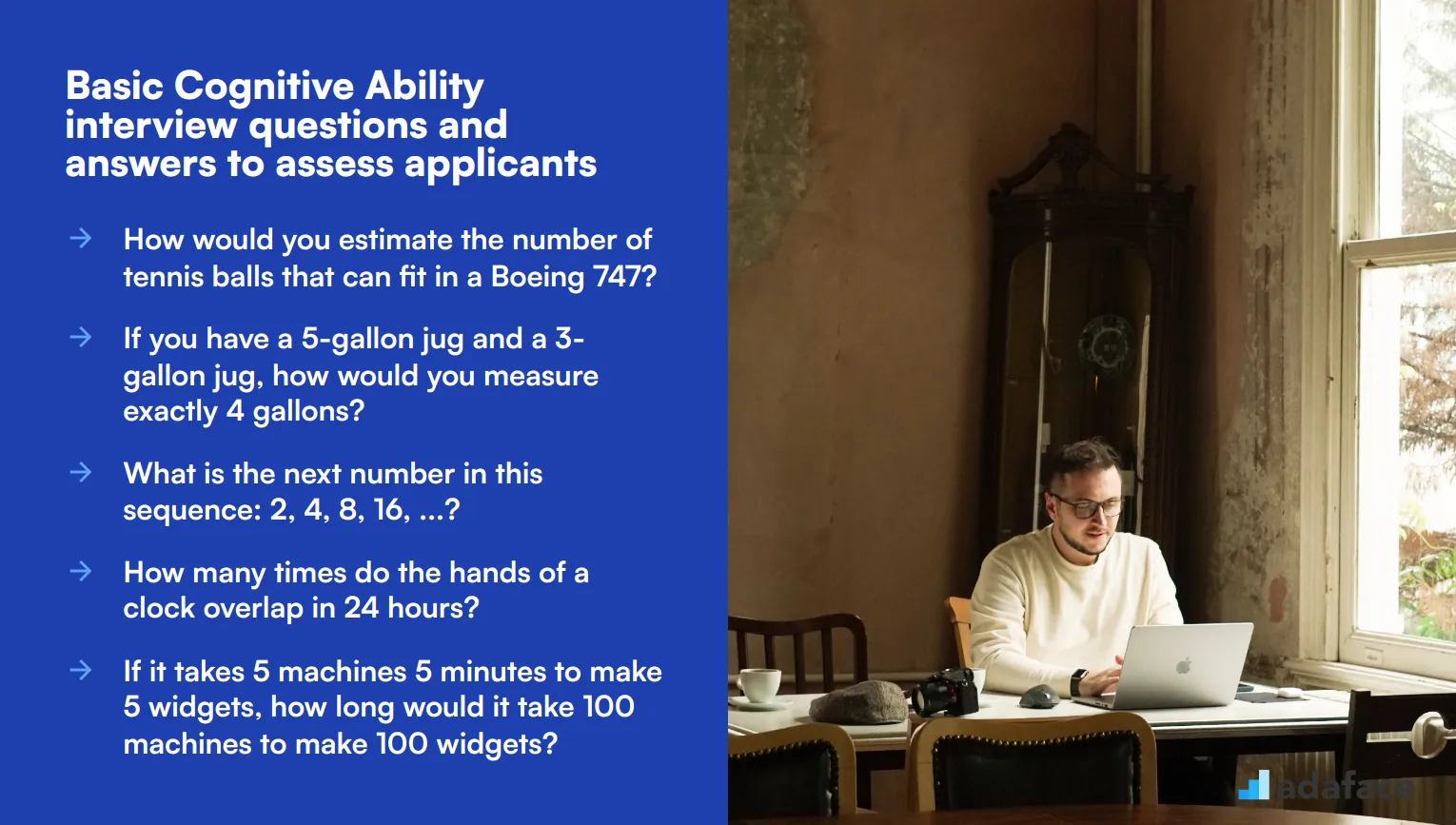
To effectively assess an applicant's cognitive abilities, use these 15 basic interview questions. These questions are designed to evaluate problem-solving skills, logical reasoning, and analytical thinking, which are crucial for roles ranging from data scientists to software engineers.
- How would you estimate the number of tennis balls that can fit in a Boeing 747?
- If you have a 5-gallon jug and a 3-gallon jug, how would you measure exactly 4 gallons?
- What is the next number in this sequence: 2, 4, 8, 16, ...?
- How many times do the hands of a clock overlap in 24 hours?
- If it takes 5 machines 5 minutes to make 5 widgets, how long would it take 100 machines to make 100 widgets?
- You have a fox, a chicken, and a sack of grain. You must cross a river with only one of them at a time. If you leave the fox with the chicken, the fox will eat the chicken. If you leave the chicken with the grain, the chicken will eat the grain. How do you get all three across safely?
- What is the minimum number of colors needed to color any map so that no two adjacent countries are the same color?
- If you have a square room with no roof, and you had to get rain to cover exactly half the floor, how would you do it?
- How many degrees are there between the hour and minute hands of an analog clock at 3:15?
- If you have 8 balls of the same size and appearance, but one is slightly heavier than the rest, how would you find the heavier ball using a balance scale in just two weighings?
- What is the probability of getting at least one 'heads' when flipping a coin three times?
- If a train travels 50 miles per hour for 3 hours in one direction, then travels back at 100 miles per hour, what is the average speed for the entire trip?
- How many times would you have to fold a piece of paper for its thickness to reach the moon?
- If you have a 3x3x3 cube made up of 27 smaller cubes, how many of the smaller cubes are not visible from the outside?
- In a room of 30 people, what's the probability that at least two people share the same birthday?
8 Cognitive Ability interview questions and answers to evaluate junior analysts
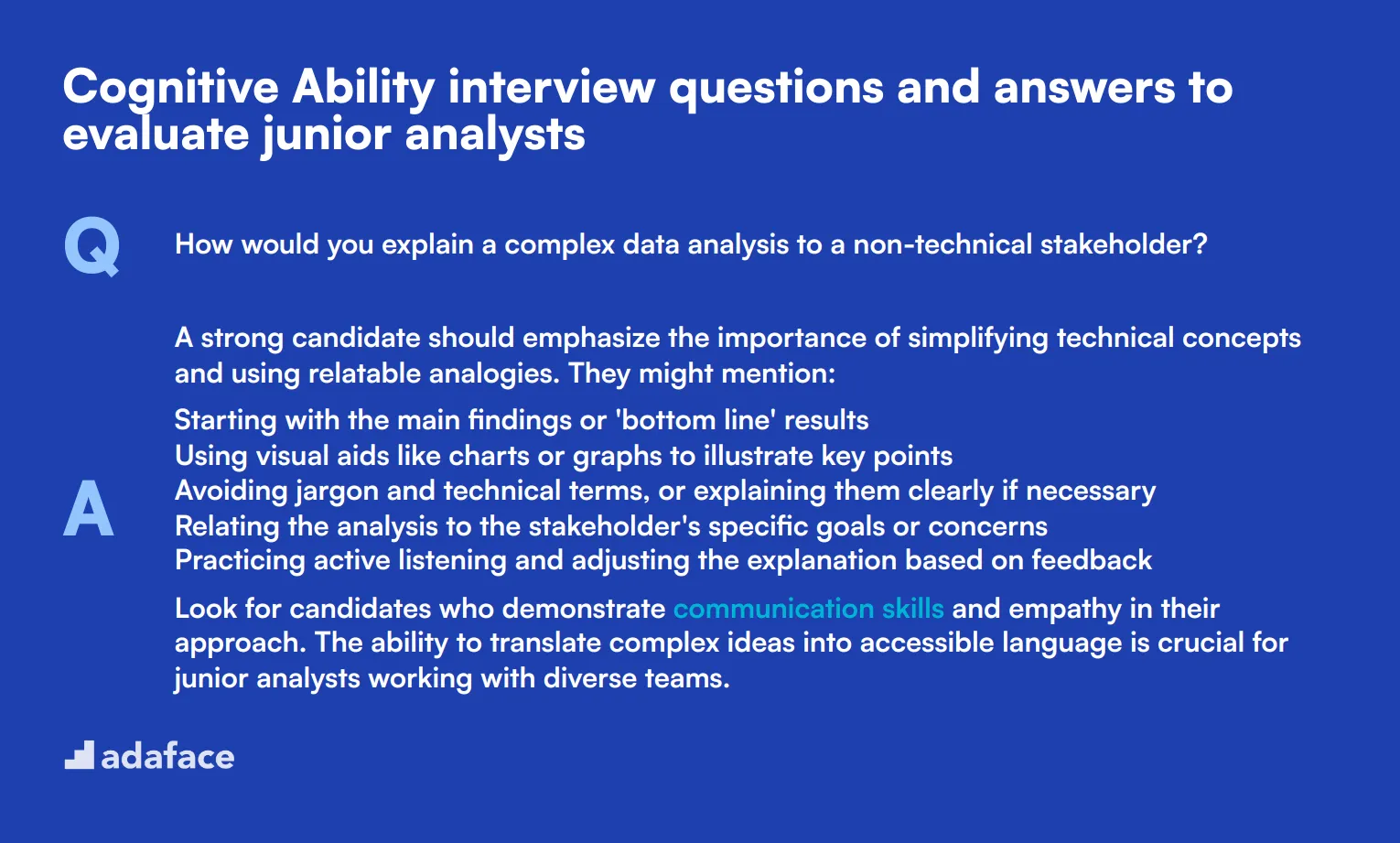
When evaluating junior analysts, it's crucial to assess their cognitive abilities alongside their technical skills. These eight questions will help you gauge a candidate's problem-solving prowess, analytical thinking, and ability to handle complex scenarios. Use them to identify promising talent who can grow into valuable assets for your data-driven team.
1. How would you explain a complex data analysis to a non-technical stakeholder?
A strong candidate should emphasize the importance of simplifying technical concepts and using relatable analogies. They might mention:
- Starting with the main findings or 'bottom line' results
- Using visual aids like charts or graphs to illustrate key points
- Avoiding jargon and technical terms, or explaining them clearly if necessary
- Relating the analysis to the stakeholder's specific goals or concerns
- Practicing active listening and adjusting the explanation based on feedback
Look for candidates who demonstrate communication skills and empathy in their approach. The ability to translate complex ideas into accessible language is crucial for junior analysts working with diverse teams.
2. You're given a dataset with missing values. How would you approach this problem?
An ideal response should outline a systematic approach to handling missing data:
- Investigate the nature of the missing data:
- Determine if it's missing completely at random (MCAR), missing at random (MAR), or missing not at random (MNAR)
- Check the percentage of missing values for each variable
- Decide on a strategy based on the investigation:
- For small amounts of missing data, consider listwise deletion
- For larger amounts, consider imputation methods such as mean/median imputation, regression imputation, or multiple imputation
- Implement the chosen method and validate results
- Document the process and any assumptions made
Look for candidates who demonstrate an understanding of the implications of missing data and show critical thinking in choosing an appropriate method. Follow up by asking about potential drawbacks of their chosen approach to assess their depth of understanding.
3. Describe a situation where you had to prioritize multiple tasks with competing deadlines. How did you manage it?
A strong answer should demonstrate the candidate's ability to organize, prioritize, and manage time effectively. Key points to look for include:
- Assessing the importance and urgency of each task
- Creating a structured plan or to-do list
- Communicating with stakeholders about realistic timelines
- Delegating tasks if possible
- Staying flexible and adjusting priorities as needed
- Using time management techniques like the Pomodoro method or time-blocking
Pay attention to how the candidate balances analytical thinking with practical execution. The best responses will show a blend of problem-solving skills and adaptability, which are crucial for junior analysts facing multiple deadlines.
4. If you noticed an unexpected spike in user engagement for a specific product feature, how would you investigate the cause?
A comprehensive answer should outline a structured approach to data investigation:
- Verify the data accuracy to ensure it's not a tracking error
- Identify the exact timeframe of the spike
- Check for any recent changes or updates to the feature
- Analyze user demographics and behavior patterns
- Look for external factors (e.g., marketing campaigns, social media mentions)
- Compare with historical data and other similar features
- Conduct user surveys or interviews if possible
- Use statistical tests to confirm if the spike is significant
Look for candidates who demonstrate curiosity and a methodical approach to problem-solving. The ability to connect different data points and consider multiple angles is crucial for a junior analyst. Consider asking follow-up questions about specific analytical tools they might use in this process.
5. How would you design an A/B test to evaluate the effectiveness of a new website layout?
A well-structured answer should include the following steps:
- Define clear objectives and success metrics (e.g., conversion rate, time on site)
- Identify the target audience and sample size
- Create two versions: the control (current layout) and the variant (new layout)
- Randomly assign users to each group
- Determine the duration of the test
- Implement tracking mechanisms for chosen metrics
- Run the test and collect data
- Analyze results using statistical methods (e.g., t-tests)
- Draw conclusions and make recommendations
Look for candidates who understand the importance of statistical significance and controlling variables. They should also mention potential pitfalls, such as seasonal effects or external factors that could skew results. This demonstrates critical thinking and attention to detail, crucial skills for a junior analyst.
6. You've been asked to forecast sales for the next quarter. What factors would you consider, and how would you approach this task?
A strong answer should demonstrate an understanding of sales forecasting methodologies and relevant factors. Key points to look for include:
- Historical sales data analysis
- Seasonal trends and patterns
- Economic indicators (e.g., GDP growth, consumer confidence)
- Market trends and competitor analysis
- Upcoming marketing campaigns or promotions
- Changes in product lineup or pricing
- Customer feedback and sentiment analysis
- Potential supply chain disruptions
Candidates should also mention specific forecasting techniques such as moving averages, exponential smoothing, or regression analysis. Look for those who emphasize the importance of combining quantitative methods with qualitative insights from stakeholders. This balanced approach is crucial for accurate forecasting and demonstrates the analytical thinking expected from a junior data analyst.
7. Explain how you would detect and handle outliers in a dataset.
A comprehensive answer should cover both detection and treatment of outliers:
Detection methods:
- Visual techniques: Box plots, scatter plots, histograms
- Statistical methods: Z-score, Interquartile Range (IQR), Grubb's test
- Machine learning approaches: Isolation Forest, Local Outlier Factor
Handling outliers:
- Investigate the cause (data entry errors, genuine anomalies)
- Remove if they're errors or irrelevant to the analysis
- Transform the data (e.g., log transformation)
- Cap at a certain value (winsorization)
- Use robust statistical methods that are less sensitive to outliers
Look for candidates who understand that the approach to outliers depends on the context of the data and the goals of the analysis. They should emphasize the importance of not blindly removing outliers without investigation, as sometimes outliers can provide valuable insights. This demonstrates critical thinking and a nuanced understanding of data analysis.
8. How would you go about cleaning and preparing a large, messy dataset for analysis?
An effective answer should outline a systematic approach to data cleaning and preparation:
- Understand the data: Review the data dictionary, check data types, and get familiar with the variables
- Handle missing values: Identify patterns, decide on imputation or deletion strategies
- Remove duplicates: Identify and eliminate redundant entries
- Correct inconsistencies: Standardize formats, units, and categories
- Handle outliers: Detect and decide on appropriate treatment
- Normalize or scale data if necessary
- Create derived variables if needed for analysis
- Validate the cleaned dataset: Cross-check with original data, perform sanity checks
Look for candidates who mention the importance of documenting the cleaning process and maintaining data lineage. They should also emphasize the iterative nature of data cleaning and the need to balance thoroughness with efficiency. This demonstrates an understanding of best practices in data preparation, a crucial skill for junior analysts working with real-world datasets.
12 intermediate Cognitive Ability interview questions and answers to ask mid-tier analysts
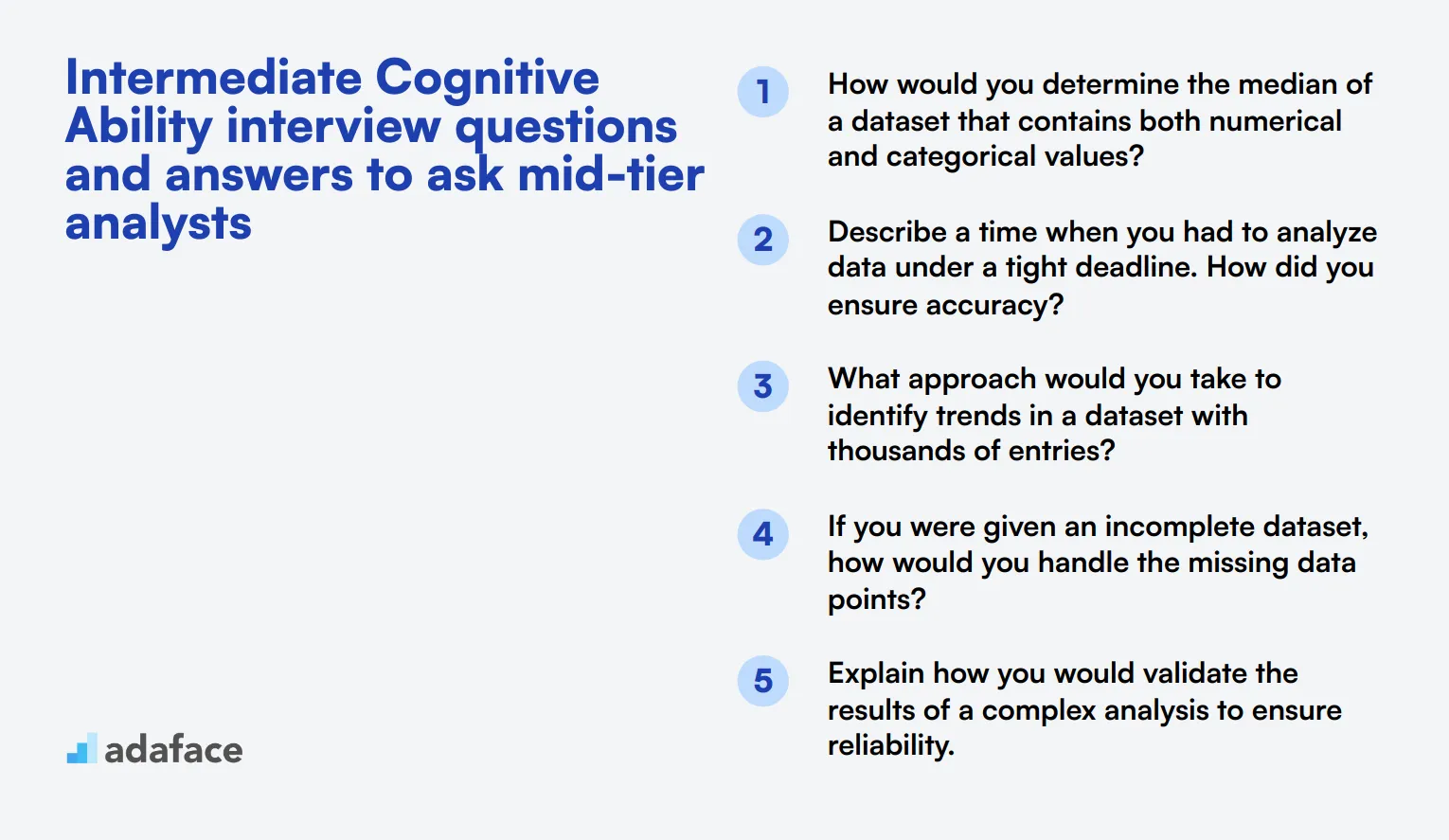
To assess the cognitive abilities of mid-tier analysts effectively, consider using these 12 intermediate questions. These questions are designed to evaluate analytical thinking, problem-solving skills, and logical reasoning, important for roles such as business analyst.
- How would you determine the median of a dataset that contains both numerical and categorical values?
- Describe a time when you had to analyze data under a tight deadline. How did you ensure accuracy?
- What approach would you take to identify trends in a dataset with thousands of entries?
- If you were given an incomplete dataset, how would you handle the missing data points?
- Explain how you would validate the results of a complex analysis to ensure reliability.
- How would you approach optimizing an inefficient algorithm in an existing system?
- Describe a situation where you had to simplify a complex problem to find a solution. What steps did you take?
- How would you approach training a junior analyst on a complex data analysis task?
- If you had to present your analysis findings to a non-technical audience, how would you ensure clarity and understanding?
- Explain how you would approach debugging an error in a large dataset.
- Describe a time when you had to use creative thinking to solve a data-related problem.
- What steps would you take to ensure that your analysis aligns with business objectives and stakeholder expectations?
7 Cognitive Ability interview questions and answers related to problem-solving
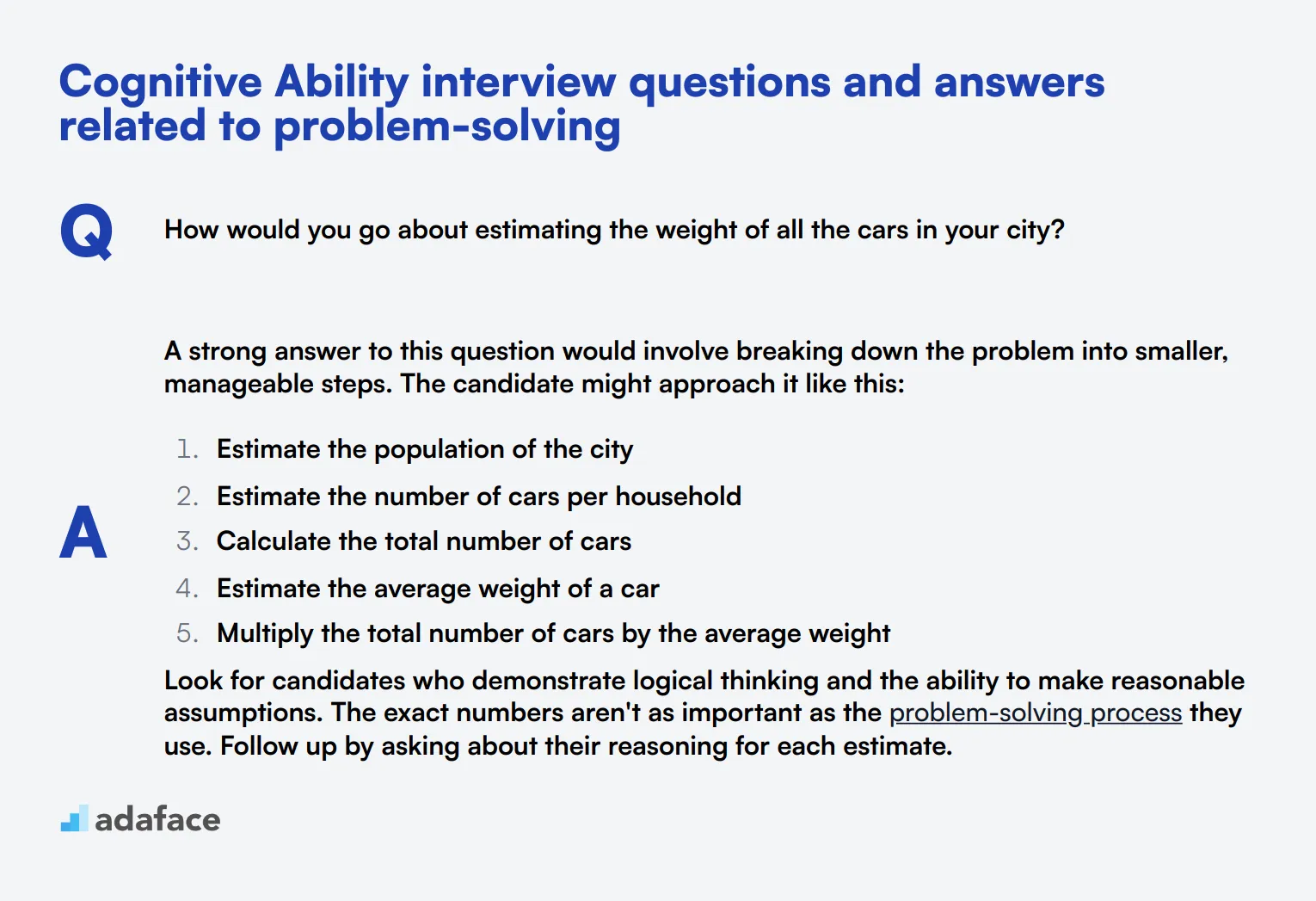
Assessing problem-solving skills is crucial for identifying candidates who can tackle complex challenges. These cognitive ability interview questions will help you evaluate a candidate's analytical thinking and creative approach to problems. Use them to gauge how potential hires might handle real-world scenarios in your organization.
1. How would you go about estimating the weight of all the cars in your city?
A strong answer to this question would involve breaking down the problem into smaller, manageable steps. The candidate might approach it like this:
- Estimate the population of the city
- Estimate the number of cars per household
- Calculate the total number of cars
- Estimate the average weight of a car
- Multiply the total number of cars by the average weight
Look for candidates who demonstrate logical thinking and the ability to make reasonable assumptions. The exact numbers aren't as important as the problem-solving process they use. Follow up by asking about their reasoning for each estimate.
2. You have a 9x9x9 Rubik's Cube. How many small cubes are on the edges?
The correct answer is 144 small cubes on the edges. Here's how a candidate might arrive at this solution:
- Identify that edges are the lines where two faces meet
- Count the number of edges: 12 (4 on top, 4 on bottom, 4 vertical)
- Calculate cubes per edge: 9 - 2 = 7 (excluding corner pieces)
- Multiply: 12 edges × 7 cubes per edge = 84 edge cubes
This question tests spatial reasoning and the ability to visualize complex structures. Look for candidates who can break down the problem systematically and explain their thought process clearly. Their approach is more important than getting the exact number right on the first try.
3. How would you design a system to detect fraudulent transactions in real-time for an e-commerce platform?
A comprehensive answer might include the following elements:
- Data collection: Gather relevant transaction data (amount, location, time, device, etc.)
- Feature engineering: Create meaningful features from raw data
- Machine learning model: Develop and train a model to classify transactions as fraudulent or legitimate
- Real-time processing: Implement a system to score transactions instantly
- Threshold setting: Determine acceptable risk levels for flagging transactions
- Continuous improvement: Regularly update the model with new data
Look for candidates who demonstrate an understanding of both technical and business aspects. They should mention the importance of balancing fraud prevention with user experience. Ideal responses might also touch on the need for a data scientist or machine learning expert in implementing such a system.
4. If you had to create a strategy for cataloging every book in a library, how would you approach it?
A well-thought-out answer might include these steps:
- Develop a classification system (e.g., Dewey Decimal or Library of Congress)
- Create a database to store book information
- Design a process for data entry (title, author, ISBN, publication date, etc.)
- Implement a physical labeling system
- Establish a method for tracking book locations
- Set up a system for handling new acquisitions and removals
- Train staff on the cataloging process
Evaluate the candidate's ability to create a systematic approach to a complex task. Look for answers that consider efficiency, scalability, and user-friendliness. Strong candidates might also mention the potential use of technology like barcode scanners or RFID tags to streamline the process.
5. How would you determine if a number is a prime number?
A solid answer would explain the process of determining primality:
- Understand that a prime number is only divisible by 1 and itself
- Check if the number is less than 2 (not prime)
- Check if the number is 2 (prime)
- For odd numbers greater than 2:
- Check divisibility by odd numbers up to the square root of the given number
- If no divisors are found, the number is prime
Look for candidates who can explain the concept clearly and provide an efficient approach. Strong answers might discuss optimization techniques, such as checking only up to the square root of the number. Candidates with a software development background might mention more advanced algorithms for large numbers.
6. How would you go about scheduling shifts for a 24/7 restaurant with 20 employees?
A comprehensive approach to this problem might include:
- Determine shift durations (e.g., 8-hour shifts)
- Identify peak hours and required staffing levels
- Consider employee preferences and availability
- Ensure fair distribution of desirable and less desirable shifts
- Account for breaks and time off
- Create a rotating schedule to balance workload
- Implement a system for shift swaps and emergency coverage
Evaluate the candidate's ability to balance multiple constraints and stakeholder needs. Look for answers that consider both employee satisfaction and business efficiency. Strong candidates might suggest using scheduling software or discuss strategies for handling unexpected absences.
7. If you were tasked with improving the efficiency of a busy intersection, what factors would you consider and what solutions might you propose?
A well-rounded answer might consider the following factors and solutions:
Factors to consider:
- Traffic volume and patterns
- Peak hours
- Accident history
- Pedestrian and cyclist needs
- Surrounding businesses and residences
Possible solutions:
- Optimizing traffic light timing
- Adding turn lanes or roundabouts
- Implementing smart traffic systems
- Improving signage and road markings
- Encouraging alternative routes or transportation methods
Look for candidates who demonstrate a holistic approach to problem-solving. They should consider various stakeholders and potential unintended consequences of proposed solutions. Strong answers might also mention the need for data collection and analysis before implementing changes.
10 Cognitive Ability interview questions about logical reasoning
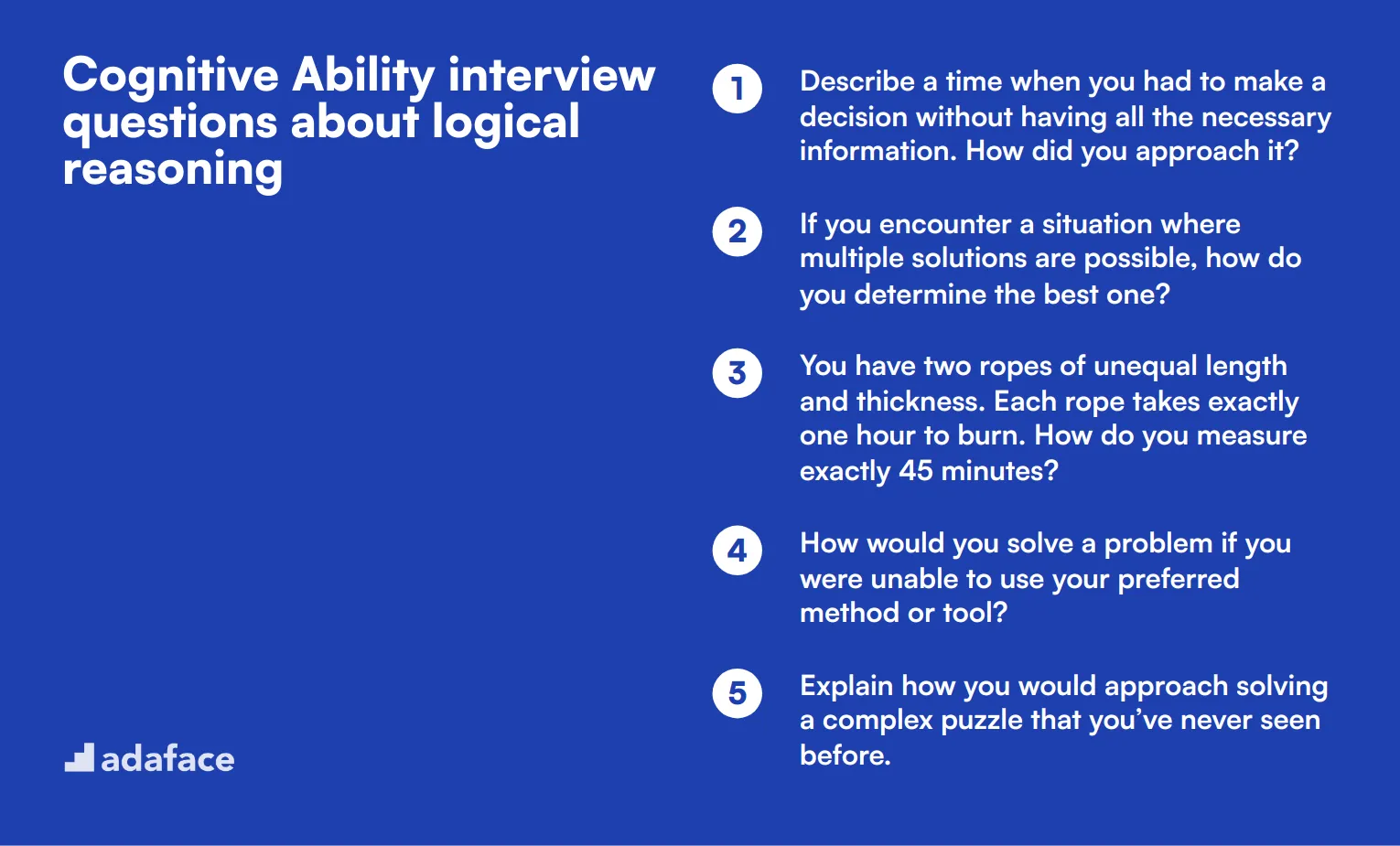
To gauge a candidate's logical reasoning skills, consider using these cognitive ability interview questions. These questions are designed to test problem-solving capabilities, critical thinking, and the ability to think on one’s feet, essential for roles listed in this job description. Use them during the interview process to identify candidates who can excel in challenging situations.
- Describe a time when you had to make a decision without having all the necessary information. How did you approach it?
- If you encounter a situation where multiple solutions are possible, how do you determine the best one?
- You have two ropes of unequal length and thickness. Each rope takes exactly one hour to burn. How do you measure exactly 45 minutes?
- How would you solve a problem if you were unable to use your preferred method or tool?
- Explain how you would approach solving a complex puzzle that you’ve never seen before.
- Imagine you have three switches, each connected to one of three light bulbs in another room. You can only enter the room once. How do you determine which switch is connected to which bulb?
- A man is looking at a portrait. Someone asks him, 'Whose picture are you looking at?' The man replies, 'Brothers and sisters, I have none. But the father of the man in the picture is my father's son.' Who is in the picture?
- How would you determine if a machine in a factory is underperforming using limited data?
- What steps would you take if a project you were leading suddenly encountered an unexpected obstacle?
- You are given a large dataset with numerous variables. How do you determine which variables are most significant for your analysis?
10 situational Cognitive Ability interview questions for hiring top analysts
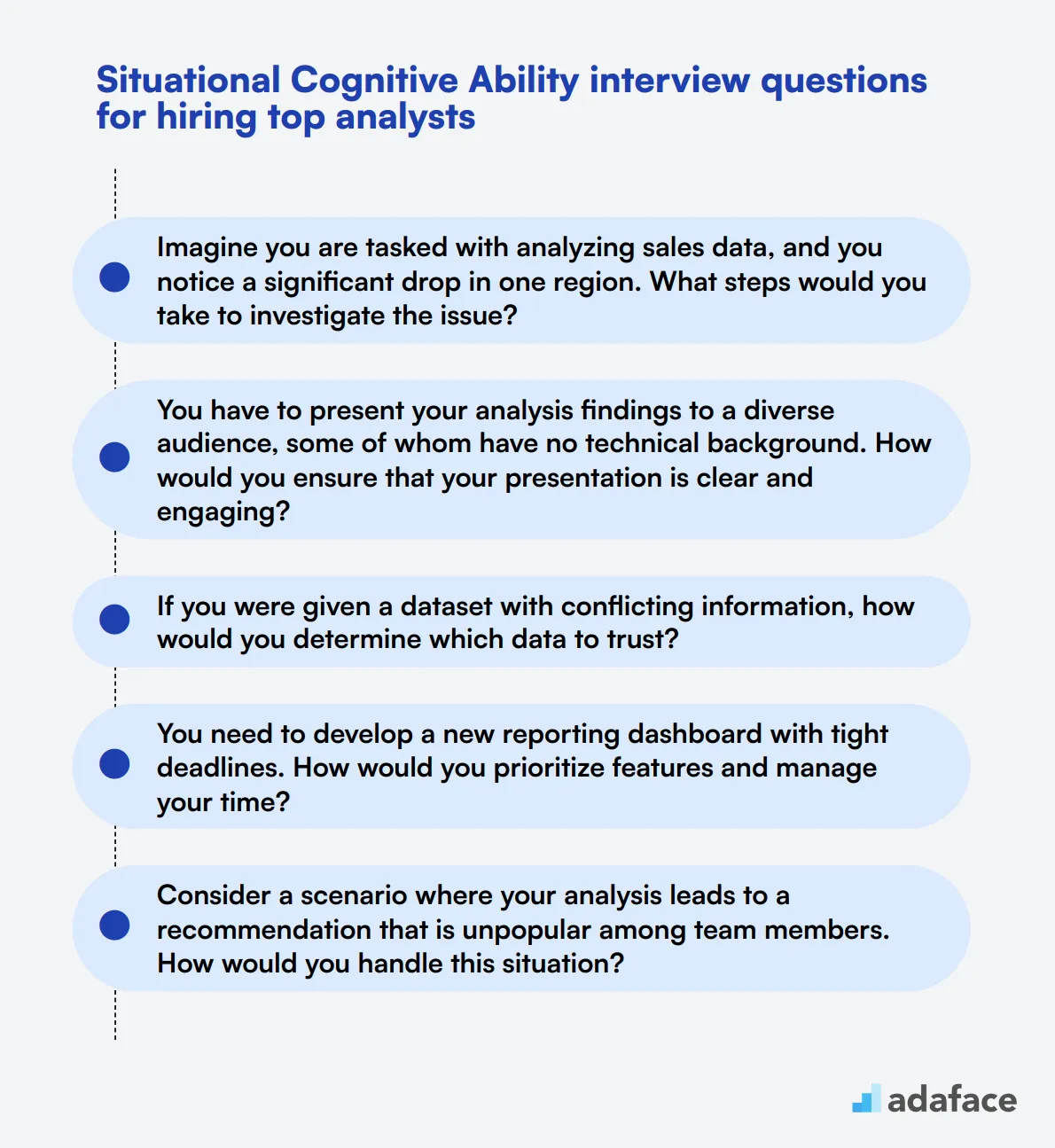
To effectively assess candidates' analytical thinking and problem-solving skills, consider incorporating these situational cognitive ability interview questions into your hiring process. They can help you gauge how applicants might handle real-world challenges they may face in roles like data analyst.
- Imagine you are tasked with analyzing sales data, and you notice a significant drop in one region. What steps would you take to investigate the issue?
- You have to present your analysis findings to a diverse audience, some of whom have no technical background. How would you ensure that your presentation is clear and engaging?
- If you were given a dataset with conflicting information, how would you determine which data to trust?
- You need to develop a new reporting dashboard with tight deadlines. How would you prioritize features and manage your time?
- Consider a scenario where your analysis leads to a recommendation that is unpopular among team members. How would you handle this situation?
- You discover an error in the data after completing your analysis. What steps would you take to address the error and communicate it to your team?
- How would you approach a situation where you are required to extract insights from a dataset with little context or documentation?
- If asked to build a predictive model with limited historical data, what techniques would you consider using to improve its accuracy?
- How would you ensure that your data analysis aligns with the company's strategic goals when starting a new project?
- If you noticed a trend in your analysis that contradicted company beliefs, how would you present your findings to encourage open discussion?
Which Cognitive Ability skills should you evaluate during the interview phase?
While a single interview can provide insights into a candidate's capabilities, it often falls short of capturing the full spectrum of their cognitive abilities. During the interview phase, it's essential to focus on specific skills that are critical to a candidate's success in the role. Below are the key cognitive ability skills to evaluate to ensure you find the best fit for your team.
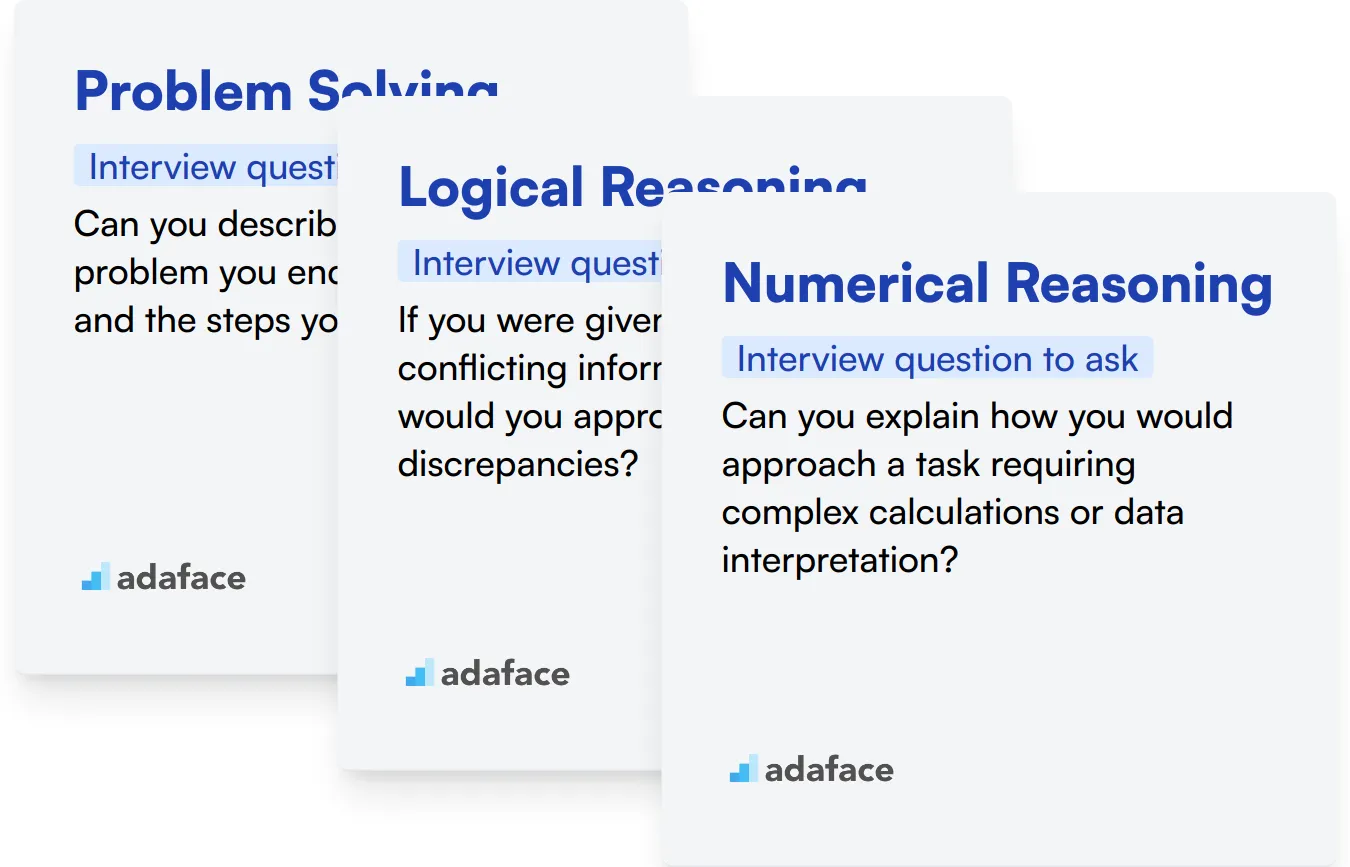
Problem Solving
To gauge problem-solving skills effectively, you may consider utilizing an assessment test with relevant MCQs. This can help filter candidates based on their ability to approach and resolve complex issues, which is crucial for roles that demand innovative thinking. You can check our problem-solving assessment test for a tailored evaluation.
Additionally, you can ask targeted interview questions to better understand a candidate's problem-solving approach.
Can you describe a challenging problem you encountered at work and the steps you took to solve it?
When asking this question, look for clarity in their explanation, including how they identified the problem, the thought process behind their solution, and the outcome of their actions. This will give you insights into their analytical and critical thinking skills.
Logical Reasoning
Implementing an assessment test with multiple-choice questions can help you evaluate logical reasoning skills efficiently. Such tests can reveal a candidate's proficiency in drawing logical conclusions from data. Explore our logical reasoning assessment test for effective screening.
You can complement testing with targeted interview questions that focus on logical reasoning.
If you were given a dataset with conflicting information, how would you approach resolving the discrepancies?
Pay attention to how the candidate breaks down the problem. Effective candidates will discuss their method for analyzing the data, identifying inconsistencies, and their approach to resolving them.
Numerical Reasoning
Consider using an assessment test to evaluate numerical reasoning skills through relevant MCQs, which can efficiently highlight candidates' strengths in this area. Take a look at our numerical reasoning assessment test to streamline your candidate evaluation.
You may also want to ask specific interview questions to assess their numerical reasoning abilities.
Can you explain how you would approach a task requiring complex calculations or data interpretation?
When posing this question, observe how clearly the candidate outlines their approach and the methodologies they employ in dealing with numerical data. This provides insight into their analytical thought process.
Hire Top Talent with Cognitive Ability Tests and Targeted Interview Questions
When hiring for roles that require strong cognitive abilities, it's important to accurately assess these skills in candidates. This ensures you find the right fit for your team and position.
The most effective way to evaluate cognitive abilities is through skill tests. Consider using a Cognitive Ability Test or Critical Thinking Test to objectively measure candidates' capabilities.
After candidates complete the tests, you can shortlist the top performers for interviews. This two-step process helps you focus on the most promising applicants and use your time wisely.
Ready to streamline your hiring process? Sign up for Adaface to access our cognitive ability tests and start identifying top talent today.
Cognitive Ability Test
Download Cognitive Ability interview questions template in multiple formats
Cognitive Ability Interview Questions FAQs
They help assess a candidate's problem-solving, logical reasoning, and analytical skills, which are critical for many roles.
Yes, they are versatile and can be tailored to assess junior, mid-tier, and top-level candidates.
Look for clarity in thought, logical reasoning, problem-solving skills, and the ability to think under pressure.
Start by identifying the key skills needed for the role and create questions that assess those skills through practical and theoretical scenarios.
These questions present a candidate with hypothetical scenarios to assess their ability to apply cognitive skills in real-world situations.
The number can vary, but a balanced range from 5 to 10 questions per interview ensures a thorough assessment without overwhelming the candidate.

40 min skill tests.
No trick questions.
Accurate shortlisting.
We make it easy for you to find the best candidates in your pipeline with a 40 min skills test.
Try for freeRelated posts
Free resources




